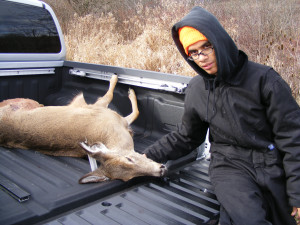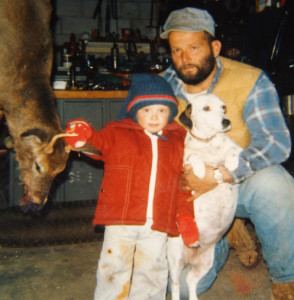A new strategy to save the tradition of hunting in Pennsylvania
My father died more than two years ago, and yet a 30-year-old picture continues to touch off a wave of emotion and tears as if his passing was yesterday.
In the photo, he kneels proudly with a 6-year-old version of me, our family dog and a small buck he shot earlier in the day.
That was my dad. He was in his element when he was in the woods. Hunting flowed through his veins and he did all he could to ignite that same passion for the outdoors in his two sons.
Hunting tradition is woven tightly into the fabric of our family — as it is with many local outdoors enthusiasts in Pennsylvania.
But tradition is not enough.
Over the past 10 years, we’ve lost 100,000 hunters, and that number continues to rapidly spiral in the wrong direction. We are now a society where most young people would prefer to hunt deer with an Xbox controller than a firearm. Add in the recent proposal by the game commission to drastically increase hunting license fees, and the pasttime enjoyed by my family over the past three decades may soon be on life support.
So how do we resuscitate a dying tradition in light of inevitable price hikes?
Recent attempts to reverse dwindling sales — such as allowing crossbows in regular archery season or the proposal to permit hunting on Sundays — is equivalent to slapping a Band-aid on a heart attack victim.
Instead, the tradition of hunting needs CPR, and that should come via the climate of the age we’re in. People are struggling to make ends meet financially. People are overweight and looking to get healthy again. Processed food is out and organic, fresh options are in.
Fortunately, hunting can be a solution to many of these issues, and it should be marketed that way.
Where else can you get fresh meat at a fraction of the cost you’ll find at the grocery store? Where else can you get a full aerobic exercise regimen surrounded by the majestic natural surroundings of our Valley outdoors? What better way to unplug from the rat race of society and get back to the basics of living in connection with nature and the environment?
Trying to look at an apples-to-apples comparison, a report from 2014 suggests that the average American eats 75 pounds of red meat (beef, pork, veal and lamb) per year. The price of 85% lean ground beef at the local Weis supermarket as of Friday was $4.89 per pound (not factoring in any sales pricing).
That would be a cost of $366.75 a year for the average person to have his red meat if it were all done up in ground beef. Price of fresh lamb, veal, steaks, etc., would only increase that amount drastically, so let’s just look at $366.75 as a low-end estimate.
If the game commission’s recent proposal for a license increase came to pass, hunters would be able to purchase an all-inclusive “ultimate” resident license for $125. For an additional $15, they would be able to add an antlerless deer tag.
Jeff Mertz, of Mertz Meats near Northumberland, estimates that off an average-sized buck, a hunter can get around 40 to 60 pounds of ground venison and an average doe yields approximately 30 to 40 pounds of ground venison (if all meat is processed into ground venison and not used for other cuts).
So for $140 worth of license, a hunter can harvest an average of 85 pounds of ground venison — 10 more than what an average American eats annually.
Yes, there are other expenses to factor in, such as ammunition, perhaps some additional clothing and whatever freezer bags or canning supplies you need to preserve the meat for use over the course of a year. However, even factoring all that in, you would be paying less than half of what it would cost for regular ground beef at the grocery store (if rates stayed the same as they are currently.)
And that’s just the venison. An ultimate license would include the ability to harvest so many other wild meat options such as rabbits, pheasants, squirrels, turkey and so much more.
Jeff Mertz, who has hunted for 56 years and has been directly connected to butchering for nearly as long, admitted Friday that a person could easily sustain himself over the course of a year off meat that was harvested via hunting.
“There are so many ways to prepare and preserve the meat you get through hunting,” he said. “Of course there is bologna and jerky along with all the regular dishes you can make. People freeze the meat and a lot are getting into canning it — which helps it last two or three years.”
All of that meat — unlike the $366.75 of ground beef from the grocery store — is also completely organic and free-range. For comparison’s sake, at the Sunbury Weis on Friday, there was one pack of 85 percent lean organic, free-range ground beef.
According to the sticker, it normally sells for $8.99 a pound — or nearly 50 percent more than regular ground beef of the same grade. If the average American was to purchase just organic ground beef at that price, it would cost $675 a year.
On top of all those benefits, hunting is also its own complete exercise program. To be successful, hunters spend plenty of time in the offseason hiking, looking for signs and scouting out the best places to hunt. They go well off the beaten path to pursue game along the hilly, brushy terrain found throughout our Valley. Public hunting land — between state game acreage and the thousands of acres near the Montour Preserve — offers a multitude of elevations and conditions, and when you are in the thick of a hunt, the adrenaline alone is enough to burn off a bunch of calories.
Those who take hunting seriously — and participate in all the physically active aspects of our local outdoor opportunities (from fishing and camping to hiking and wintertime exploration) — can easily enjoy a natural exercise experience that can rival anything offered at a local gym. For what it is worth, the nearby YMCA’s rate for an annual adult membership is $496.
Ultimately, hunting is much more than the archaic “sport” that so many non-hunters think it is. Hunting is also more than the traditions that we longtime hunters have learned to cherish for generations.
Hunting provides a true way of life that can save people money, provide healthier food and give them a more active lifestyle.
That is the sort of message we all need to better promote before our hunting traditions truly become a thing of the past.
How do you recommend we save hunting in Pennsylvania?



